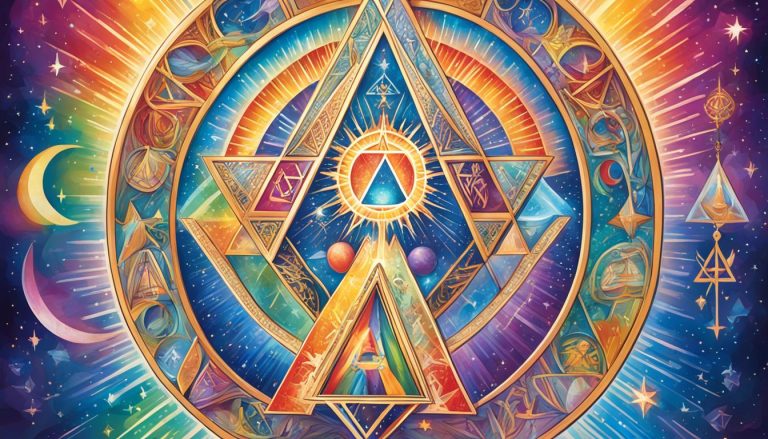Maya: A Journey Through Spiritual Traditions
Welcome to an enlightening journey into the spiritual world of the name Maya. This name ties together ancient and modern cultures, rich in spiritual and cultural meanings. As we dive into this adventure, we’ll discover the various ways the name Maya is viewed globally.
The journey from ancient roots to today’s spiritual practices shows Maya as a symbol of our quest to grasp the divine. You’ll see the deep significance of Maya through different lenses. This journey illuminates our desire to connect with the spiritual realm.
Key Takeaways
- Discover the ancient and contemporary contexts of the spiritual meaning of the name Maya.
- Appreciate the cross-cultural and interfaith dimensions of the name’s spiritual significance.
- Examine the intriguing etymological history and its implications for the name’s profundity.
- Explore how the Maya name meaning echoes throughout various religious teachings.
- Gain insights into the universal themes embedded within the name’s spiritual narrative.
- Begin to see the name Maya as more than just a moniker, but as a key to deeper spiritual understanding.
A comprehensive and enlightening exploration of the spiritual significance of Maya
Let’s start a journey to understand the significance of the name Maya. It carries ancient roots and deep spiritual meanings. As you dive deep, you’ll find stories and beliefs from different cultures that still matter today.
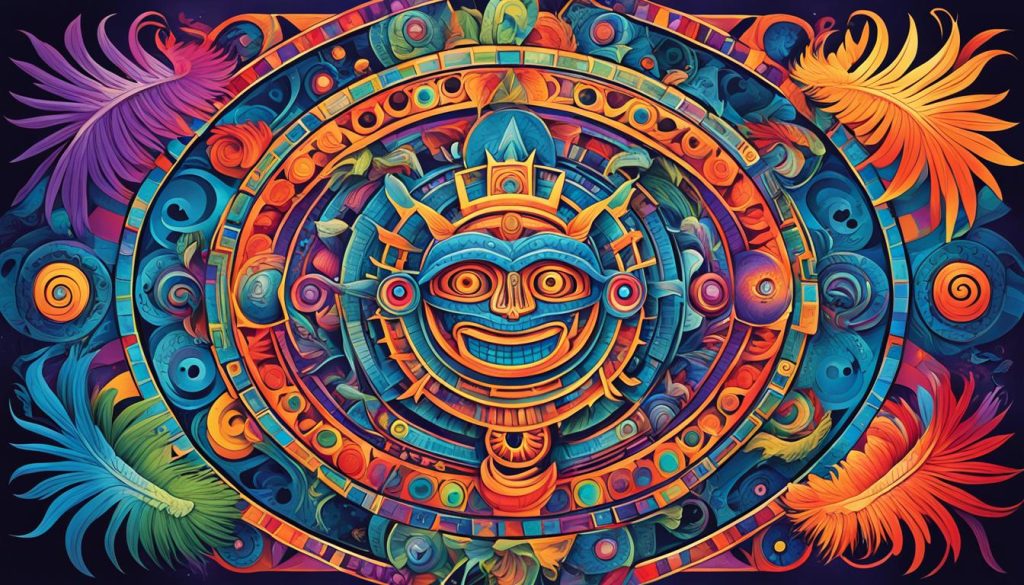
In Sanskrit, Maya means ‘illusion’ or ‘magic.’ It suggests that our world is a complex illusion. This idea has moved through many spiritual paths, growing while keeping its mystery and depth.
“Maya—A name that encompasses the world’s mystical facade, inviting us to ponder on truths beyond our sensory perceptions.”
Spiritual leaders and scholars talk about the spiritual significance of Maya. They show how it affects personal spirituality. Deep down, learning about Maya helps us see reality in different ways. It shows how we connect with unseen forces that shape our lives.
- Looking at how the name Maya has changed from ancient texts to today’s spirituality.
- Exploring how religious writings and spiritual talks interpret the name.
- Gathering thoughts from spiritual leaders on Maya’s influence.
Maya stirs dialogue among those keen to uncover spiritual mysteries. It leads us on a personal journey. This journey helps us see our lives and the universe in a new light.
| Culture | Interpretation | Philosophical Insights |
|---|---|---|
| Sanskrit Origins | Maya as ‘Illusion’ | The world as perceptual play and divine artistry |
| Modern Spirituality | Maya as ‘Enigma’ | A journey towards self-discovery and cosmic understanding |
| Spiritual Discourses | Maya as ‘Teaching’ | Life lessons on deciphering reality beyond the veil |
Understanding the significance of the name Maya is like unraveling a puzzle. Yet, it offers a chance to learn through the wisdom of old and new worlds. Its deep meaning connects us to our shared spiritual past. It encourages us to look within and continues to be relevant in our quest for meaning.
Delve into the symbolic and metaphorical associations of Maya in Jewish spiritual teachings
Inside Jewish mysticism, the Maya name origin reveals a unique connection between the name and the complexities of life. Names in Jewish traditions have deep metaphysical importance. Looking into the symbolic meaning of the name Maya reveals its power as a bridge to philosophical thoughts on existence.
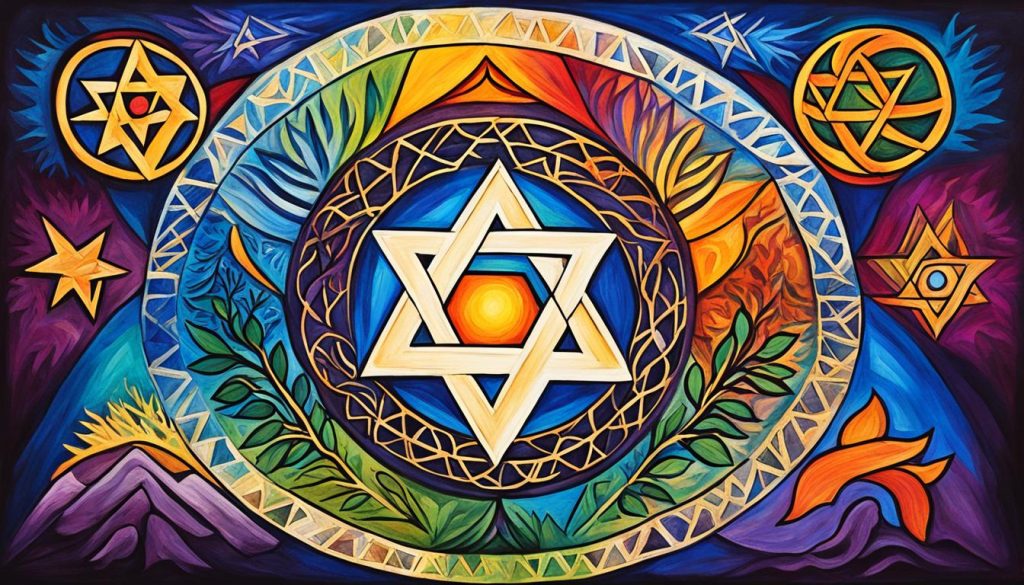
Jewish traditions aim to find truth and understand reality. Here, the name Maya suggests a mix of godly acts and our world’s realities. Jewish spiritual texts give a deep view of the world. In this view, Maya shines as a key example.
“In Jewish mysticism, names carry the core of creation—through names, we touch the secrets of the universe. Maya, hence, becomes a mirror for viewers to see the mix of godly and earthly aspects.”
Below is a table showing the different views and uses of the name Maya in Jewish spiritual teaching:
| Aspect | Description | Relation to Maya |
|---|---|---|
| Truth (Emet) | The ultimate quest in spirituality and morality. | Maya is seen as a name hinting at the search for deeper truth. |
| Reality (Metziut) | Understanding existence and the universe. | Maya represents the complex nature of reality. |
| Divine Intervention (Hashgacha Pratit) | Belief in a meaningful divine world presence. | Maya stands for the idea of god being involved in life’s challenges. |
When talking to rabbis and Jewish mysticism scholars, the symbolic meaning of the name Maya fits these spiritual principles. A detailed look shows Maya as representing life’s changing nature. This insight comes from articles about how Judaic studies interpret names.
So, exploring the Maya name origin in Jewish teachings shows more than a name. It opens a door to deep mysteries of life. This journey is both enlightening and energizing. It shows how names like Maya have rich meanings that reflect the spiritual life of a culture.
The spiritual implications and symbolism of Maya within the Christian tradition
In the Christian tradition, the spiritual meaning of the name Maya blends with spiritual symbolism. It is not well-known in the Bible. Yet, Christian theology sees a special meaning in this name. It reveals spiritual aspects that align with Christian values.
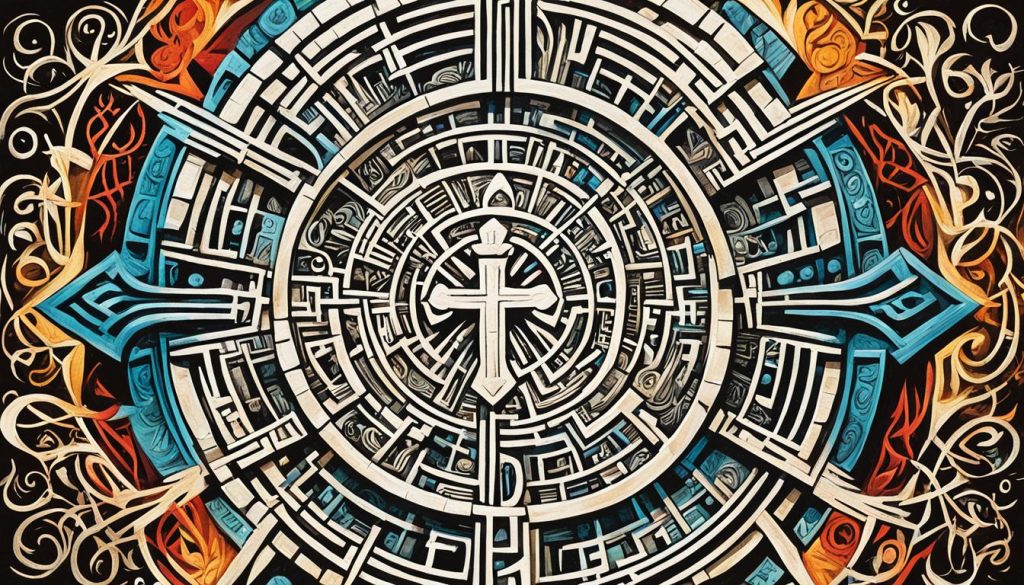
Christian thinkers and mystics rarely see the name Maya in their studies. But, discussing it opens new conversations on spirituality. It highlights the fight between the physical world and spiritual truth. This concept is similar to Maya’s dual nature in other traditions. These ideas show how Maya’s spiritual meaning matches the Christian quest for enlightenment and salvation.
Studying Maya spiritual symbolism shows resemblances to the Christian tale of creation, sin, and redemption. This story is about moving from illusion to truth. Christianity teaches to look beyond life’s surface. This idea is like the ‘veil of Maya’ in other beliefs.
Ordinary Christians might love the name Maya for its beautiful sound. They think it links to Mary, Jesus’s mother. So, Maya gains a unique spiritual meaning in Christian circles. It influences Christian naming traditions and reflects on spiritual values.
- Theological Analysis: A discussion on how the principles behind the name Maya reflect on key Christian beliefs about reality and the search for divine truth.
- Mystical Perspectives: Insights from Christian mystics who, while historically not focusing on Maya, offer viewpoints relevant to the essence it represents.
- Iconographic Interpretations: Where the name Maya and its associated symbols fit within the realm of Christian art and literature as elements illustrating spiritual narratives.
- Personal Resonance: Anecdotal evidence of how the name Maya, though not scriptural, impacts the personal spirituality of believers, adding a layer to its spiritual meaning.
To conclude, Maya might not be a key biblical figure. Still, its spiritual symbolism sparks meaningful discussions among Christians. Thinking about the deeper significance of names can deepen our spiritual journey within Christianity.
The Islamic understanding of the name Maya
The name Maya isn’t from Quranic texts, but it’s popular among Muslims worldwide. The origin of the name Maya is quite interesting in Islamic studies. It brings up many views on how it fits into Muslim cultures today. The name’s linguistic appeal and the value Islam places on names lead scholars to explore its spiritual possible meanings.
Islamic scholars look deeply into the meanings of names. They are discussing Maya just as thoroughly. Even though Maya isn’t mentioned in Quranic texts, it could represent respected qualities in Islam like grace. This analysis honors the Islamic practice of adding spirituality into daily life.
When one considers the vastness of Islamic civilization, it becomes clear that the Maya name meaning transcends borders, encapsulating global threads of shared cultural and linguistic heritage.
Finding the origin of the name Maya in Islam isn’t only about its roots. It’s also about seeing its impact on Muslim naming traditions. This reflects the depth of Islamic scholarship, where names signal identity and cultural overlaps.
- Exploration of linguistic connections in Arabic and other languages
- Associations with positive attributes recognized by the Muslim community
- Interpretation by Islamic scholars on the deeper meaning of non-Arabic names
- Adoption and adaptation into modern Muslim societies
The name Maya’s popularity in Muslim families shows the evolving nature of Islamic culture. Current naming trends blend tradition and modernity, crossing old boundaries. This creates a diverse collection of names and their meanings.
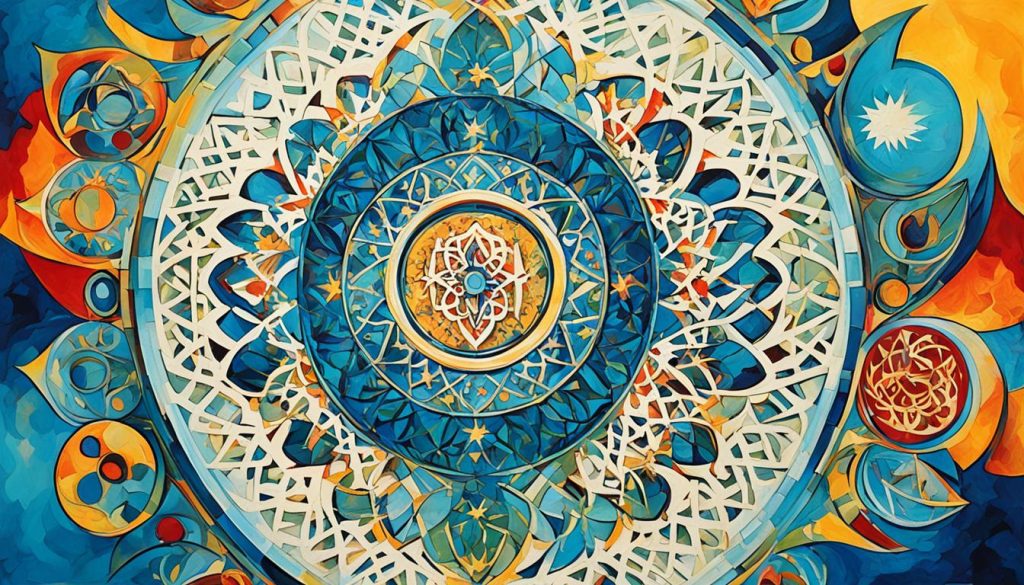
The conversation about Maya is part of a larger cultural dialogue. It reflects a long-standing Islamic tradition of valuing the beauty and power of names. As we delve deeper, the Maya name meaning remains a symbol of cultural exchange and spiritual exploration in Islamic thought and tradition.
Delve into the Buddhist interpretation of Maya and its connection to the concept of “the great illusion”
The name Maya in Buddhism is tied to the idea of illusion, often called “Maya-jaal” or the great illusion. It suggests that what we see as reality is always changing, a core idea in Buddhism that matches with the significance of the name Maya. Knowing where the Maya name origin comes from helps us grasp Buddhism’s key teachings: impermanence (anicca), no-self (anatta), and suffering (dukkha).
Maya is seen as leading beings into a false sense of living, filled with wants and needs. It’s like being lost in a maze that Maya oversees, making us question our own perceptions. This teaches us to see through our misconceptions.
The idea of Maya drives us to look within and seek truth by overcoming illusions. Learning about Buddha’s talks and his interactions reveals how the Maya name origin is closely linked with finding the ultimate truth. It shows us how to escape Maya’s deceptive cover.
Let’s look at Maya’s role in Buddhism through a few key concepts:
- Anicca: Understanding Maya as impermanent makes us think about the changing nature of life.
- Dukkha: Maya reflects on how suffering comes from holding onto things that won’t last.
- Anatta: Through Maya, we learn the idea of no-self, accepting that there’s no permanent ego.
This teaches us Maya is more than a name. It’s an illusion to see past for spiritual growth. Looking at Maya this way shows its universal relevance, connecting deeply to growth in Buddhism.
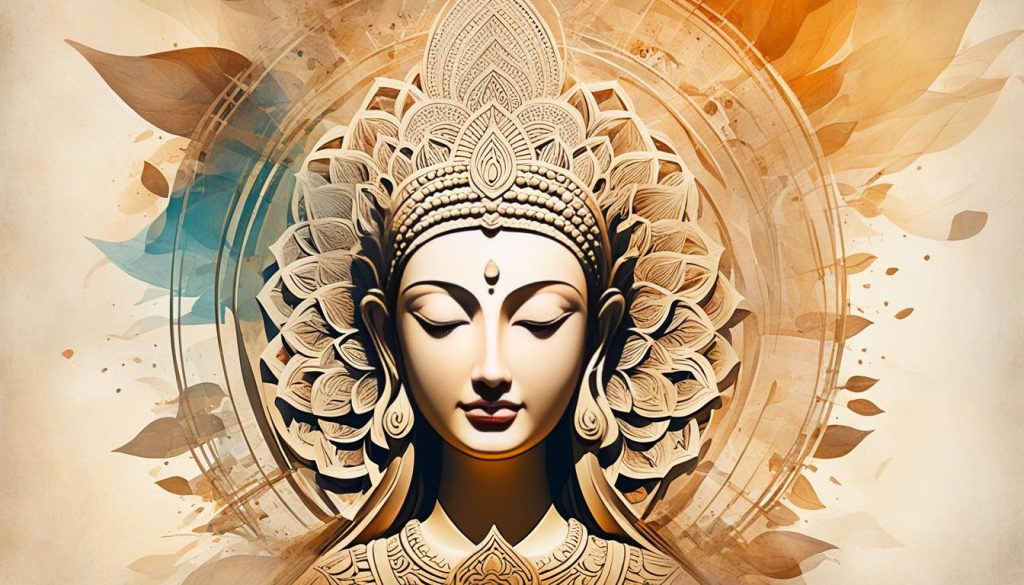
Exploring Maya spirituality is a deep dive into its philosophical meaning. The name reminds us that reality is forever changing and points us toward enlightenment, beyond Maya’s illusions.
“Just as a painter paints, and as in the painting, there are many designs, but only one painting; so in this world created by suffering and principled by ignorance, creatures have many different appearances, but are only name and form.”
The above quote captures Buddhist views on Maya, showing its role in our varied experiences of life. By studying Buddhist texts and engaging in discussions, we come to understand Maya’s complex nature, guiding us along the Dharma’s path.
The similarities and differences in the spiritual significance of Maya across these traditions
Exploring the spiritual significance of Maya shows us common and unique insights. Various traditions interpret the symbolic meaning of the name Maya in their own way. Still, they share some core ideas. Let’s look into these interesting differences and similarities.
Judaism, Christianity, Islam, and Buddhism each give Maya special meanings that go beyond just a name. Jews might see Maya as revealing deep truths about life. Christians could view it through grace and God’s mystery. Muslims might celebrate God’s creativity with it, while Buddhists urge us to see beyond the obvious.
| Tradition | Conceptual Interpretation of Maya | Key Symbolic Themes |
|---|---|---|
| Judaism | Metaphorical representation of life’s intricacies | Truth, reality, divine connection |
| Christianity | Potential symbol of grace and mystery | Redemption, divine plan, sacredness |
| Islam | Expression of creativity and divine artistry | Beauty of creation, oneness of God |
| Buddhism | Reference to the illusion of the material world | Impermanence, enlightenment, the nature of reality |
Maya’s spiritual meaning is widely recognized for its depth and impact. This shows in each tradition’s quest for broader understanding. Though the symbolic meaning of the name Maya changes with different beliefs, it enriches our knowledge. It also helps us appreciate the world’s spiritual diversity more.
Common threads and universal themes that emerge from the exploration of the name Maya
In the world of spiritual traditions, we find common concepts. These span across cultures, sharing a human bond. The Maya name meaning and Maya spiritual symbolism are at the heart of these universal stories. When we look into the name Maya, we see recurring ideas of illusion versus reality. This contrast shows us the thin line between what we see and a deeper spiritual life.
Our research across disciplines shows Maya’s universal appeal. It connects diverse beliefs, shining a light on life’s mysteries. Maya prompts discussions on our life perceptions and the truths hiding beneath. To grasp this, a look at Maya spiritual symbolism from different views helps.
| Tradition | Maya Symbolism | Perceived Reality |
|---|---|---|
| Hinduism | The grand illusion; the material world | Maya stands for the world around us, an illusion blocking the ultimate truth. |
| Buddhism | The deceptive aspect of existence | It ties to life’s fleeting nature, pointing to attachment and suffering as Maya’s effects. |
| Modern Spirituality | A metaphor for awakening | Maya often enters talks on going beyond what our senses perceive. |
The insights on the Maya name meaning go beyond just a name. They dive into metaphorical realms, urging us to seek life’s true essence. It’s intriguing how one name can hold so much insight. It challenges us to think deeply, connecting people from different cultures in shared wonder.
As we face life’s complexities, Maya stands as a spiritual lighthouse. Its symbols lead us through universal quests for truth and enlightenment. Embracing these shared insights, we grow in our self and worldly understanding. This reveals the boundless wisdom hidden in the simplicity of a name.
Key insights and takeaways from the exploration of the spiritual meaning of Maya
Our journey to understand Maya’s spiritual meaning took us through various cultures, eras, and beliefs. Each culture added a unique insight into this mysterious name. Originating from ancient times, Maya’s name carries a mysterious allure. It is still significant in spiritual discussions today. From its Sanskrit roots meaning ‘illusion’ to modern interpretations, Maya encourages us to think deeply about reality.
Maya’s spiritual meaning crosses religious lines, telling a universal story about human perception. It connects deeply with people in Judaism, Christianity, Islam, Buddhism, and beyond. Maya can symbolize life’s complexities or remind us of life’s fleeting moments. Its spiritual importance helps both seekers and believers on their inner journey.
This exploration might deepen your appreciation for the impact of a name on personal and collective consciousness. Think about how Maya’s stories and meanings could influence your path. Its spiritual legacy shows our ongoing search for meaning. It invites us to see how ancient wisdom shapes our understanding, identity, and connection today.



